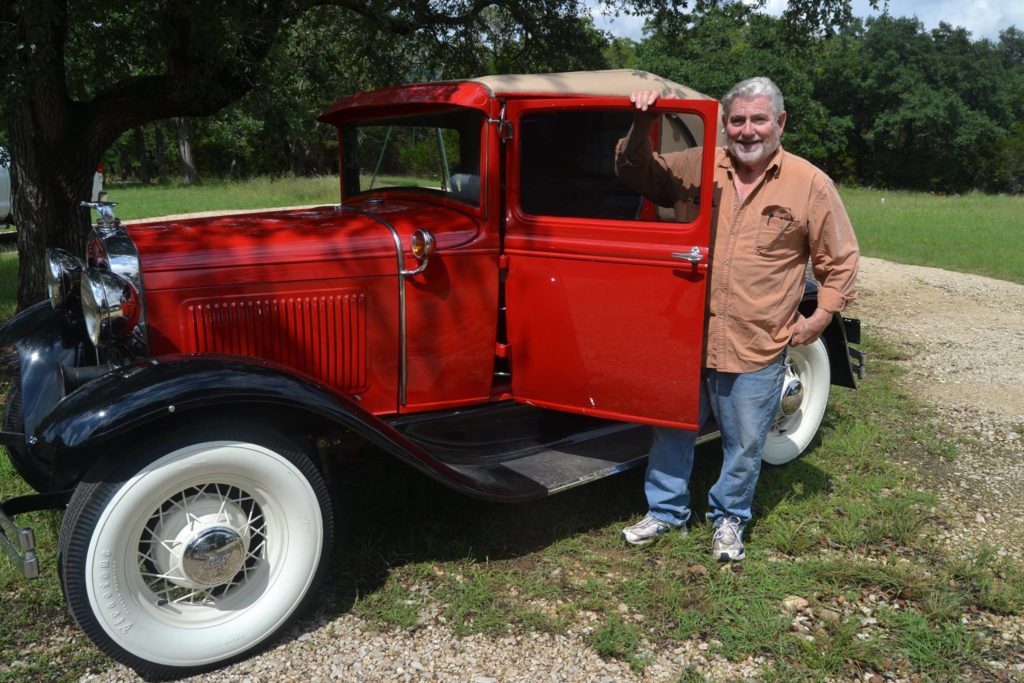Art is never finished, only abandoned. – Leonardo da Vinci
Mark L. Casey
My Dad is a Man
by
 My Dad is a man. I don’t mean he is a male — that much is obvious. I mean he is a man in the sense that he is what we call a manly man.
My Dad is a man. I don’t mean he is a male — that much is obvious. I mean he is a man in the sense that he is what we call a manly man.
He was a good athlete. He hunts. He fishes. He has at least one of every power tool ever made…and he has used them all. Heck, at age 76 he still uses them all. He is an accomplished mechanic who restores vintage cars like Ford Model Ts. He welds. He mows. He chainsaws. He is a master with the smoker and grill. His brisket is still the standard by which I measure all others. What I am saying is that by every standard by which masculinity is usually measured, he is manly.
It has always been easy for me to look at him and see what a man looks like, but that is not what makes him so special. There are manly men everywhere. What makes him special is the ease with which he models both his manliness and his sensitivity. From the time I was a small child he was comfortable with hugging me and telling me he loved me. We still hug. We still affirm our love for each other. I have come to realize that not all fathers know how to do that. He is a gentle and kind man. He is a man of faith.
My grandfather died when I was five years old. I still remember him, but the memories are veiled by years and by my age at the time. So, I don’t know if he modeled this physical and verbal form of fatherhood for my Dad to see. I will find out today when I speak to him on Father’s Day. Regardless of where he learned it, Dad decided that he would tell his children that he loves them and that he would embrace them to demonstrate his love. He has been consistent with it. I am grateful for that. It helped me see that there is no contradiction between masculinity and sensitivity.
I have friends who did not have that kind of model in their father. Some of them struggle with showing affection to their children. I cannot blame them because the way we are raised has a powerful impact on how we parent. If you are one of those men who struggles with kindness, affection, and expressiveness with your children, let me challenge you to break the cycle. Find a man who does it the way you want to do it and have a conversation with him. Try it sometime with your children even though it may feel strange. You have the opportunity to start a new family tradition that you can pass along to your children and grandchildren. Boys need to see this positive practice of masculinity, and girls need to see it as well.
There are really no downsides to my Dad’s approach. I highly recommend it, and I try to practice it myself.
So, thank you, Miller Lee.
I love you.
Important Book for Parents of Teens
How does that teenage brain work?
by
At Forward Story we are always interested in information that relates to the way our bodies work and the way families work. I have discovered a book that deals with both. The book is The Teenage Brain: A Neuroscientist’s Survival Guide to Raising Adolescents and Young Adults
It’s a shame this book was not available when we were raising our teenagers. It might have made the whole experience even more enjoyable for both them and us. Having listened to an interview with Dr. Jensen, who is herself the mother of teenage sons, I believe this book can truly help you if you are a parent, or a grandparent of teens. Also, if you work with teens as a teacher, counselor, or mentor, I think you will be able to produce value from it as well.
If you read the book, please share with us what you think about it:
Books are not absolutely dead things, but do contain a potency of life in them to be as active as that soul was whose progeny they are; nay they do preserve as in a vial the purest efficacy and extraction of that living intellect that bred them. – John Milton from the tract “Areopagitica.”
My Responsibility with Regard to My Potential
And Yours with Regard to Yours
by
 We have all seen it before. A naturally gifted athlete with tons of potential refuses to work to develop that potential, and he or she ends up wasting it. We had a guy like that on our team.
We have all seen it before. A naturally gifted athlete with tons of potential refuses to work to develop that potential, and he or she ends up wasting it. We had a guy like that on our team.
It is sad.
I find it easy to get judgmental about that guy and about others who waste their potential.
Yet, it occurs to me that I also have specific and unique talents, abilities, and background that create my potential. The real question is whether I am putting in the work to realize my potential? Am I living up to my potential or am I instead wasting it?
That is a challenging question to answer with total honesty.
I have come to believe that it is my ethical responsibility to live up to my potential and to achieve my ambitions. To do anything less is to waste what I have been given. To me, that would be unethical.
My family, my community, and my world are counting on me to contribute what I can and to be the best version of me possible. They deserve nothing less.
So how do I achieve my potential?
Dan Fogelberg’s lyrics in “Run for the Roses” resonate with me:
It’s breeding
And it’s training
And it’s something unknown
That drives you and carries you home
While he is talking about race horses, I find application there for us. There is nothing we can do about our “breeding,” but the training and the “something unknown” is where we can reach our potential.
So, what is your potential? What is your responsibility with regard to it? What are you doing today to achieve it?
Go as far as you can see; when you get there, you’ll be able to see farther. – J.P. Morgan
